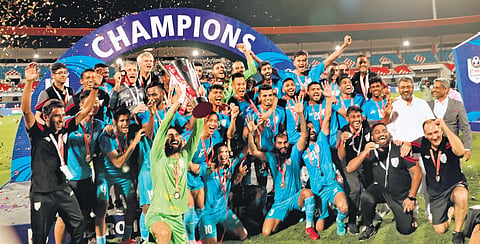

BENGALURU: It’s a throwback to a different era! The Blue Tigers enter the tournament with a lot to play for. The opener in Bengaluru on Wednesday will see them take on neighbours Pakistan, a fixture that hasn’t happened in almost five years. After threatening to fade into irrelevance for over the last decade, the SAFF Championship finally feels significant again.
There was a time when the Championship was the most keenly-awaited event on India’s international football calendar. Back then, the Asian Cup was a bridge too far, international friendlies were unheard of and an entire World Cup qualifying campaign consisted of two unwinnable matches against a much stronger opponent. Naturally, the SAFF Championships was where the likes of IM Vijayan and Baichung Bhutia worked their magic.
Things changed in the 2010s when changes in global football threatened to push the championships into irrelevance. With the AFC changing the format of World Cup and Asian Cup qualifiers, India were suddenly assured a healthy number of competitive games each cycle. Qualification for the Asian Cup became easier with the tournament’s expansion to 24 teams. India outgrew one-time rivals like Sri Lanka and Pakistan, which made the tournament rather predictable until the final — you have to go back 20 years to 2003 for a SAFF final that did not feature India. Last year, months after India clinched a fourth title in six attempts, India captain Sunil Chhetri went on record saying the SAFF Championships should now be contested by India’s U23 team. Indeed, this was something that was attempted by former coach Stephen Constantine in 2013, when a largely U23 side lost to Maldives in the final.
This time though, things are different. India enters the fourteenth edition of the tournament with a lot to play for. On one hand, a much-tougher field, with the likes of Lebanon and Kuwait, will prove the Blue Tigers, fresh off a morale-boosting victory in the Intercontinental Cup in Bhubaneswar, with more valuable playing time before the Asian Cup in January. On the other, the draw ceremony for the 2026 World Cup qualifiers is set to happen in July and India will need to be at their best to prevent a dip in rankings.
Before the Intercontinental Cup, India looked set to take up their familiar place in Pot 3, which would have left them with two tough opponents in the first group stage. However, victory over Lebanon in the final catapulted India to 99th in the live FIFA rankings, and to 18th in Asia. This means that, as things stand, India are now the final team in Pot 2 and stand a good chance of getting a much more navigable challenge in the group phases. All they have to do is to maintain their rankings superiority over Lebanon till the end of the tournament.
The SAFF Championships though are a potential banana peel with every team bar Lebanon vastly inferior to India in rankings. Even a draw will lead to a loss of ranking points which will put India’s position under threat. Igor Stimac’s men will have to be at their best.
A day before the opener against Pakistan, the Croatian coach dispelled any notion of complacency. “This SAFF Championship is going to be very competitive. Our group is special (Pakistan, Nepal and Kuwait), and every game will be different,” he said. “Let’s not be misled by the great performance against Lebanon, as every day is a new challenge. Keeping consistency is very important for us”
Due to only getting visas at the last possible minute, Pakistan will virtually be travelling from the airport to the Kanteerava turf. However, Stimac dispelled any notion of an easy game. “Let’s not speak about the rankings here. Pakistan were better than Kenya (in their 0-1 loss) away from home. They created better chances and were more aggressive. Yes, they defended deep, but they have six to seven players who were developed abroad.”